
From prescriptions to pain killers to transplantation of human organs, the perplexities of medical ethics extend far beyond the confines of medicine. This book offers over 100 engrossing case studies that guide the reader to an understanding of the ethical aspects of medical care. The cases illustrate dilemmas arising in everyday practice—what to tell a dying patient, selecting a surgical approach, choosing between brand-name and generic drugs—as well as the ethical consequences of advanced technology—prenatal diagnosis that might result in the decision to abort, or keeping an irreversibly comatose patient alive with support methods.
Robert M. Veatch first shows readers how to identify ethical issues and points out that an important element in making a decision is to identify the person responsible for it. Then, in analyzing the classical moral question "What is the right thing to do?" he cites situations that were actually faced by patients and medical professionals. He explores a number of specific ethical problems in contemporary medicine: abortion, sterilization, contraception, transplantation, hemodialysis, genetic counseling, and human experimentation, among others. The last chapter focuses on death and dying.
Ethical positions are never forced upon the reader. Instead, the author is careful to present alternatives and to discuss the consequences of a particular decision. His book is written for patients, their families and friends, nurses, technicians, counselors, social workers, physicians, employers, and lawyers—indeed for anyone affected by the burgeoning power of medical intervention.


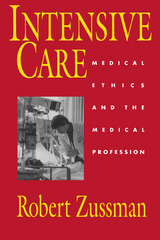
His book is a portrait of the way careful planning is undermined by the unpredictability of illness and the persistence of self-interest, by high principle and curious compromise.

In this book Paul Carrick charts the ancient Greek and Roman foundations of Western medical ethics. Surveying 1500 years of pre-Christian medical moral history, Carrick applies insights from ancient medical ethics to developments in contemporary medicine such as advance directives, gene therapy, physician-assisted suicide, abortion, and surrogate motherhood. He discusses such timeless issues as the social status of the physician; attitudes toward dying and death; and the relationship of medicine to philosophy, religion, and popular morality. Opinions of a wide range of ancient thinkers are consulted, including physicians, poets, philosophers, and patients. He also explores the puzzling question of Hippocrates' identity, analyzing not only the Hippocratic Oath but also the Father of Medicine's lesser-known works.
Complete with chapter discussion questions, illustrations, a map, and appendices of ethical codes, Medical Ethics in the Ancient World will be useful in courses on the medical humanities, ancient philosophy, bioethics, comparative cultures, and the history of medicine. Accessible to both professionals and to those with little background in medical philosophy or ancient science, Carrick's book demonstrates that in the ancient world, as in our own postmodern age, physicians, philosophers, and patients embraced a diverse array of perspectives on the most fundamental questions of life and death.

This book is the first comprehensive examination of medical ethics in the Renaissance. It investigates the ethical considerations, evaluations of procedures, and techniques of problem-solving in the writings of European physicians and surgeons from the mid-sixteenth through the mid-seventeenth centuries.
While much of the medical practice and literature of the Renaissance remained a continuation or reinterpretation of ancient medicine, Winfried Schleiner reveals an emerging self-conscious field of medical ethics that should be considered modern, as it increasingly separates medicine from theology, the cure of the body from that of the soul. The exceptions to this trend appear in the discussions of certain sexual topics, such as masturbation, by physicians close to the Counter-Reformation. Analyzing the writings of Protestant, Catholic, and Jewish physicians—the latter developed the most secular medical ethics of the era—he probes the dominant and emerging philosophical ideas together with conceptions of the role of physicians and of physical well-being.
Schleiner selects several topics to explore the development of ethical ideas in depth: placebos and the broader issue of lying to patients; the treatment of hysteria; masturbation; and the prevention of sexually transmitted diseases—subjects that are still highly charged moral as well as medical topics today.
This pioneering study will be of value to ethicists and to historians of science, medicine, and Renaissance and gender studies.
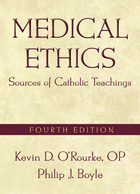
In a single convenient resource, this revised and updated edition of a classic text organizes and presents clearly the documents of the Catholic Church pertaining to medical ethics. Introductory chapters provide the context for interpreting the Church's teachings and theological values, guiding the reader in how to apply the teachings to particular ethical dilemmas and helping the reader to understand the role of conscience within the Catholic tradition.
The teaching of the Church in regard to health care ethics is pertinent not only for health care professionals and students, but for all who are concerned about the common good of society. Medical Ethics examines specific teachings of the Church on over seventy issues in clinical and research ethics, including abortion, AIDS, artificial insemination, assisted suicide, cloning, contraception, euthanasia, gene therapy, health care reform, organ donation and transplantation, organizational ethics, stem cells, surrogate motherhood, and withholding and withdrawing life support.
O'Rourke and Boyle bring this fourth edition up to the present day by incorporating recent papal documents regarding the social aspects of health care, assent to Church teaching, and the 2008 papal instruction Dignitas personae, an extremely influential document that illuminates such controversial dilemmas as prenatal adoption, frozen embryos, and genetic diagnosis.

In a single convenient resource, this book organizes and presents clearly the documents of the Catholic church pertaining to medical ethics. Introductory chapters provide the context for interpreting the Church's teachings and guide the reader in applying the teachings to particular ethical quandaries.
This third edition has been updated to incorporate the statements issued since the preparation of the second edition. The authors have revised the introductory chapters to include ideas from the papal encyclical Splendor Veritatis and "Instruction of the Ecclesial Vocation of the Theologian," published by the Vatican Congregation for the Doctrine of the Faith, concerning the various levels of the teachings of the Church. Other new statements included in this edition are relevant topics from the papal encyclical Evangelium Vitae (abortion, euthanasia, amniocentesis, suicide and withdrawing life support); the Vatican Congregation of Doctrine and Faith on uterine isolation; the U.S. bishops on the care of anencephalic infants, genetic testing, and cloning; and the Pennsylvania Catholic Conference on the treatment for rape in Catholic hospitals.

Medical ethics draws upon methods from a wide array of disciplines, including anthropology, economics, epidemiology, health services research, history, law, medicine, nursing, philosophy, psychology, sociology, and theology.
In this first book to systematically examine, critique, and challenge some of these disciplines and their methods in light of their influence on medical ethics, leading scholars present particular methods that have played significant roles in the field. The methods addressed include philosophy, religion and theology, professional codes, law, casuistry, history, qualitative research, ethnography, quantitative surveys, experimental methods, and economics and decision science. Reviewing each, they provide descriptions of techniques, critiques, and notes on resources and training. Physician-assisted suicide and euthanasia are used as an illustration of the richness of multidisciplinary work applied to individual issues. Similarly, genetic testing is used as an example of how multiple descriptive methods may privilege certain findings.
Methods in Medical Ethics is a valuable resource for scholars, teachers, editors, and students in any of the disciplines that have contributed to the field. As a textbook and reference for graduate students and scholars in medical ethics, it offers a rich understanding of the complexities of both moral questions and their answers.
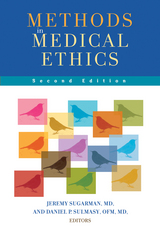
Medical ethics draws upon methods from a wide array of disciplines, including anthropology, economics, epidemiology, health services research, history, law, medicine, nursing, philosophy, psychology, sociology, and theology.
In this influential book, outstanding scholars in medical ethics bring these many methods together in one place to be systematically described, critiqued, and challenged. Newly revised and updated chapters in this second edition include philosophy, religion and theology, virtue and professionalism, casuistry and clinical ethics, law, history, qualitative research, ethnography, quantitative surveys, experimental methods, and economics and decision science. This second edition also includes new chapters on literature and sociology, as well as a second chapter on philosophy which expands the range of philosophical methods discussed to include gender ethics, communitarianism, and discourse ethics. In each of these chapters, contributors provide descriptions of the methods, critiques, and notes on resources and training.
Methods in Medical Ethics is a valuable resource for scholars, teachers, editors, and students in any of the disciplines that have contributed to the field. As a textbook and reference for graduate students and scholars in medical ethics, it offers a rich understanding of the complexities involved in the rigorous investigation of moral questions in medical practice and research.

Drawing on the controversial case of “Ashley X,” a girl with severe developmental disabilities who received interventionist medical treatment to limit her growth and keep her body forever small—a procedure now known as the “Ashley Treatment”—Reconsidering Intellectual Disability explores important questions at the intersection of disability theory, Christian moral theology, and bioethics.
What are the biomedical boundaries of acceptable treatment for those not able to give informed consent? Who gets to decide when a patient cannot communicate their desires and needs? Should we accept the dominance of a form of medicine that identifies those with intellectual impairments as pathological objects in need of the normalizing bodily manipulations of technological medicine?
In a critical exploration of contemporary disability theory, Jason Reimer Greig contends that L'Arche, a federation of faith communities made up of people with and without intellectual disabilities, provides an alternative response to the predominant bioethical worldview that sees disability as a problem to be solved. Reconsidering Intellectual Disability shows how a focus on Christian theological tradition’s moral thinking and practice of friendship with God offers a way to free not only people with intellectual disabilities but all people from the objectifying gaze of modern medicine. L'Arche draws inspiration from Jesus's solidarity with the "least of these" and a commitment to Christian friendship that sees people with profound cognitive disabilities not as anomalous objects of pity but as fellow friends of God. This vital act of social recognition opens the way to understanding the disabled not as objects to be fixed but as teachers whose lives can transform others and open a new way of being human.
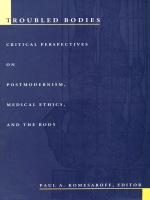
These essays examine the ways in which the consideration of ethical questions is shaped by the structures of knowledge and communication at work in clinical practice, by current assumptions regarding the concept of the body, and by the social and political implications of both. Representing various perspectives including medicine, nursing, philosophy, and sociology, these essays look anew at issues of abortion, reproductive technologies, the doctor-patient relationship, the social construction of illness, the cultural assumptions and consequences of medicine, and the theoretical presuppositions underlying modern psychiatry. Diverging from the tenets of mainstream bioethics, Troubled Bodies suggests that, rather than searching for the correct "coherent perspective" from which to draw ethical principles, we must apprehend the complexity and diversity of the discursive systems within which we dwell.
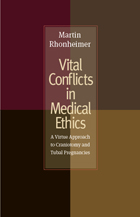
READERS
Browse our collection.
PUBLISHERS
See BiblioVault's publisher services.
STUDENT SERVICES
Files for college accessibility offices.
UChicago Accessibility Resources
home | accessibility | search | about | contact us
BiblioVault ® 2001 - 2024
The University of Chicago Press









